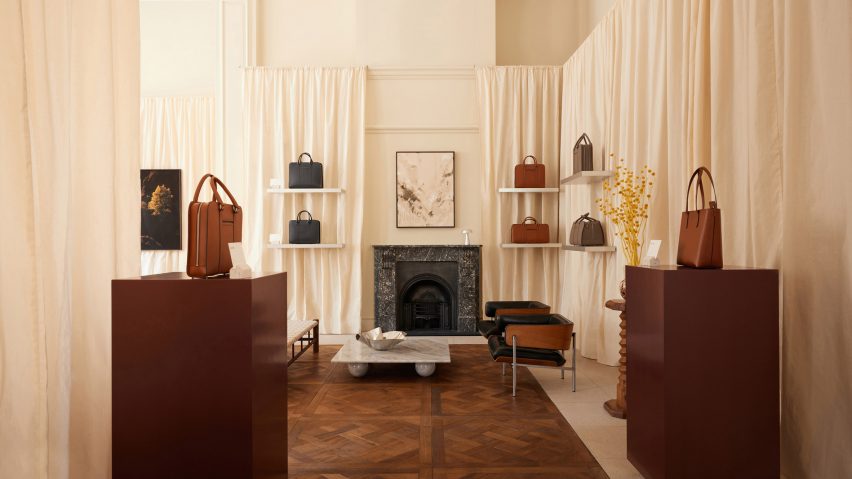Interiors studio Tabitha Isobel has designed a gallery-like store in central London for luxury luggage brand Carl Friedrik, featuring a rich and inviting palette comprising dark wood, metal and draped fabrics.
Carl Friedrik approached studio founder Tabitha Organ to design the company's first physical store, located in a Grade-II listed building on Regent Street just off Piccadilly Circus.
Organ and her team developed a scheme for the 65-square-metre space that references the pared-back look and materiality of the company's products, which combine heritage details with modern styling.
"The brand style of Carl Friedrik is quite minimalistic and they wanted that to come across in the interiors," Organ told Dezeen.
"The brief was to design a space that emulated an art gallery and concept store whilst also being practical, warm and inviting – a space where the products could take centre stage, be admired and have space to breathe," she added.
The building's listed status meant that only minor alterations could be made to the existing interior, which retained several of its original features including ornate cornicing and rich Versailles oak flooring.
The previous tenants had painted the walls a cold shade of grey and the space featured shelving in a traditional style that didn't reflect Carl Friedrik's more contemporary values.
Organ chose a lighter, warmer shade for the walls that makes the most of daylight entering through windows on two sides. She also used calico fabric throughout the interior to soften the overall aesthetic and give it a more welcoming feel.
Due to the short-term nature of the lease on this space, everything in the store was designed to be easily dismantled and reused in an alternative venue if required.
Drapes hung in front of two of the walls conceal the existing cabinetry and provide a theatrical backdrop for smaller bags and items displayed on aluminium shelves.
Fabric suspended from the ceiling also surrounds a central column, helping to partition the large space and create a layered effect that draws the customer's eye through the room.
Bespoke plinths designed to display larger luggage items are finished in a consistent minimal and monolithic style to ensure attention is focused on the products.
The plinths were made in the north of England by fabricator Studio Tuesday using stained oak or wood lacquered in Carl Friedrik's brand colour.
Throughout the store, Tabitha Isobel used aluminium and chrome to introduce reflective accents that catch the eye. The plinths are set on recessed aluminium bases that lighten their visual mass and create a floating effect.
Brushed aluminium was also used for the base of a custom-made display table featuring an inset panel made from the same chocolate-coloured leather as some of the brand's products. There are no tills in the store as all orders are taken using handheld devices.
A corner of the space is designated as a cosy lounge area organised around an existing fireplace. It features a woven bench positioned opposite a pair of mid-century armchairs and a marble coffee table chosen to complement the scheme's material palette.
Portable lamps by Danish brand &tradition and a bowl by German firm Philippi add further metallic details, while the stone product card holders positioned around the store are made by Organ's brother Tiger Nicholson, a stonemason based in Henley-on-Thames.
To enhance the gallery-like feel, artworks including photographs by Daniëlle Siobhán and paintings by Melanie Anne Haynes provide focal points on some of the walls.
Carl Friedrik's longer-term vision is to open additional stores that will utilise the same minimalistic style and rich material palette as the Regent Street store.
Tabitha Organ established her studio in 2023 after a decade of working in the industry for studios including Conran and Partners and Tatjana von Stein.
The Carl Friedrik store is her first retail project after working predominantly on residences including a London townhouse that combines natural materials with futuristic details.
The photography is by Daniëlle Siobhán.

